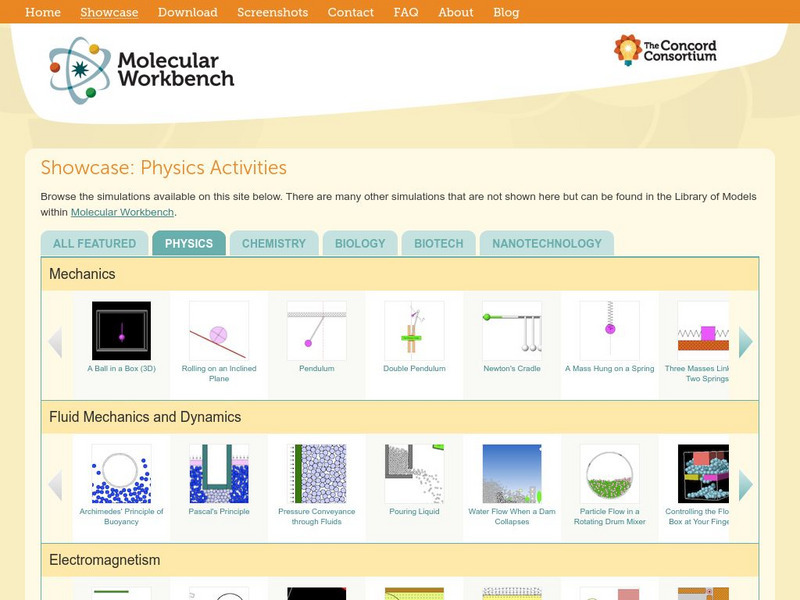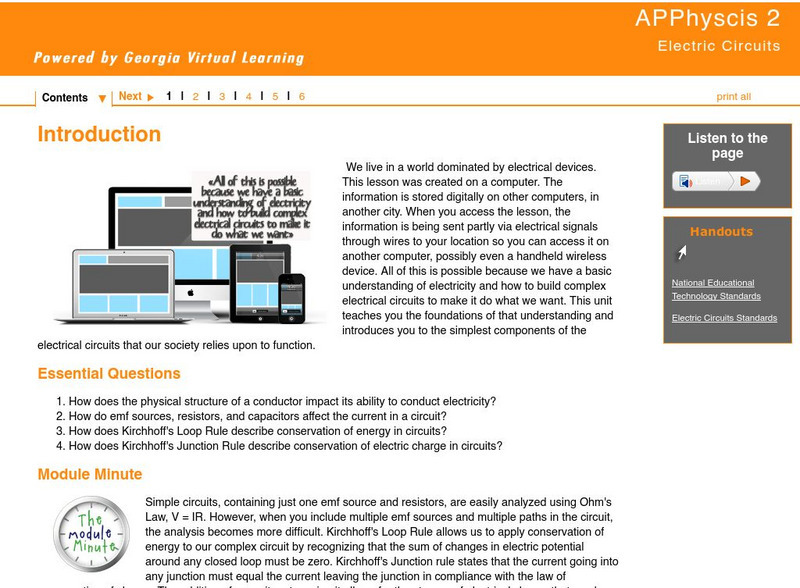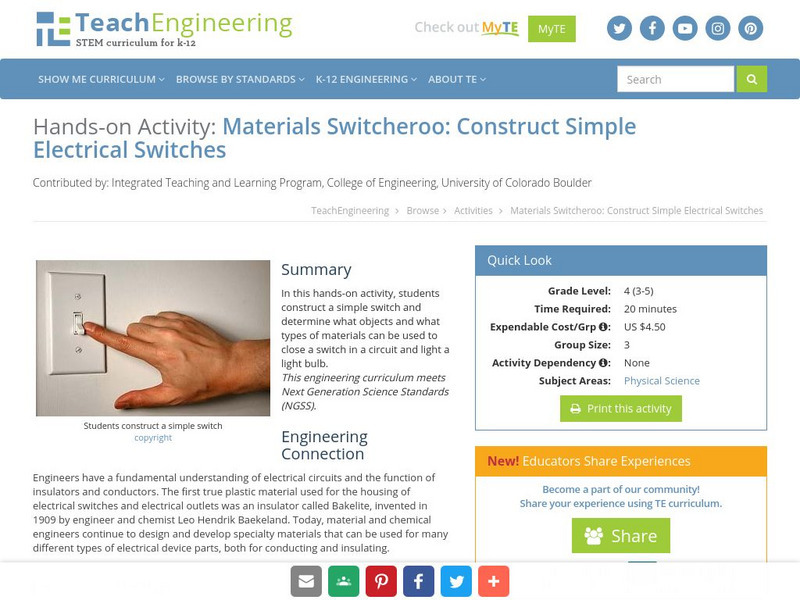Curated OER
Introduction to Elementary Circuits
Students explore how a circuit works and create a circuit to use energy from a battery to light a bulb. In this introduction to circuits lesson, the students study the parts of a circuit and have a class discussion of what would happen...
Curated OER
Adobe
In this adobe worksheet, students read about adobe soil and how it was used for building because of its insulating properties. Students complete 3 short answer questions.
Curated OER
Electric Shock: Caution!
In this electricity worksheet, students read about how electricity flows and the force that causes the flow. Students read about electric shock and then complete 3 short answer questions.
Curated OER
Ohm's Law
Students explore Ohm's Law. Following given instructions, students build a physical model of a conductor. They observe a relationship between the current, voltage and resistance in a conductor. After experiments, students explain the...
Curated OER
What are Conductors and Insulators?
Students explore simple circuits. Students conduct a variety of experiments to discover their level of conductivity. Students summarize and explain experimental findings. Students are introduced to passive causality.
Curated OER
TE Activity: Build a Charge Detector
Students examine how electrical force takes place between two objects by building an electroscope. They apply the electroscope to determine an objects' charge intensity and to see what factors influence electric force.
Curated OER
Switcheroo
Students construct a simple switch and determine what objects and what types of materials can be used to close a switch in a circuit and light a light bulb.
Curated OER
Electrifying the World
Students explore the fundamental concepts of electricity. They examine different circuit diagrams to study how electricity flows. They finish by creating their own simple circuit.
Curated OER
Rock the Rocky Road
Second graders keep a steady beat, pay attention to tempo and watch the conductor.
Curated OER
Conductors and Insulators
Students explore electrical terms and circuits. In this conductor lesson students divide into groups and complete a lab on electricity.
Curated OER
Buckyball
In this molecules worksheet, students read about the discovery of new carbon molecule which has been nicknamed buckyball. Students answer 2 short answer questions.
Curated OER
Brain POP - Electricity
In this electricity activity, students answer 22 fill in the blank questions about conductors, flow of electrons, electrical circuits, and magnets.
Curated OER
Science Word Search
In this science instructional activity, learners identify and locate various science related vocabulary terms. There are 21 words located in the puzzle.
Curated OER
Music: Individual and Group Practice
Third graders, in groups and individually, perform various musical pieces on their instruments. After demonstrating how to play steady beats, they also play counter melodies to songs such as "Peace Like a River." While some students...
Curated OER
Accomplished Practice # 10
Fourth graders performs on instruments in an ensemble, maintaining a common tempo, blending instrumental timbres, and matching dynamic levels. They respond to the tempo and dynamics cues of the conductor.
Concord Consortium
Concord Consortium: Molecular Workbench Showcase: Physics, Electromagnetism
Students can use these simulations to understand concepts in electromagnetism. Simulations are available on the following concepts: Lorentz Force, The Hall Effect, capacitor, conductor, transistor, cyclotron, static electricity....
University of Pennsylvania
Eugene Ormandy a Centennial Celebration
A wonderful exhibit of this incredible man who was a talented musician as well as the music director for the Philadelphia Orchestra for 42 years.
Science Buddies
Science Buddies: Which Materials Are the Best Conductors?
There are two main types of materials when it comes to electricity, conductors, and insulators. What are they made of? Find out by testing different materials in a circuit to see which ones conduct the most electricity.
Other
Experiments on Air by Henry Cavendish
Cavendish's 1785 original paper on phlogiston and air. Fascinating reading.
Canada Science and Technology Museum
Canada Science and Technology Museum: Background Information for Electricity
The Canada Science and Technology Museum answers some of the most common questions about electricity. For example, get the definition of electricity, the difference between alternating and direct currents, and learn how a fuse works.
Georgia Department of Education
Ga Virtual Learning: Ap Physics 2: Electric Circuits
This unit teaches students the foundations of electrical circuits and introduces them to their simplest components. Covers series and parallel circuits, Kirchhoff's Rules, Ohm's Law, RC circuits, resistivity, and capacitance.
TeachEngineering
Teach Engineering: Build a Charge Detector
In this hands-on activity, students explore the electrical force that takes place between two objects. Each student builds an electroscope and uses the device to draw conclusions about objects' charge intensity. Students also determine...
TeachEngineering
Teach Engineering: Will It Conduct?
Students build their own simple conductivity tester and explore whether given solid materials and solutions are good conductors of electricity.
TeachEngineering
Teach Engineering: Switcheroo
In this hands-on activity, students construct a simple switch and determine what objects and what types of materials can be used to close a switch in a circuit and light a light bulb.

























